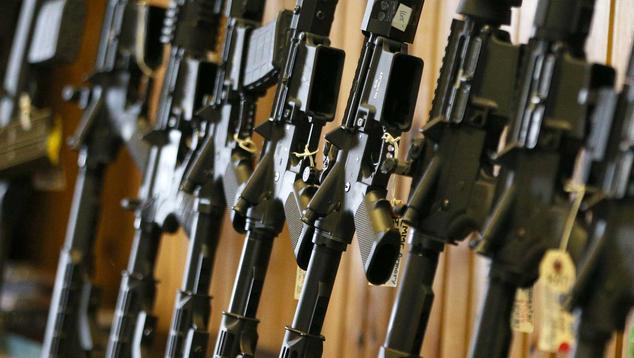Story Highlights
- 66% of Americans support stricter gun laws, up 14 points since October
- 55% prefer Congress pass new gun laws in addition to enforcing current laws
- 55% of voters say gun policy "extremely important" to midterm vote
WASHINGTON, D.C. -- Roughly a month after mass shootings at a grocery store in Buffalo, New York, and an elementary school in Uvalde, Texas, the public's support for stricter gun laws has risen sharply from its seven-year low in October. The 66% of Americans who now want laws covering the sale of firearms to be stricter is up 14 percentage points and is the highest since shortly after the Parkland, Florida, high school shooting in 2018.
A record-high 55% of Americans have an appetite for not only enforcing existing gun laws more strictly but also passing new gun legislation. And with the midterm elections looming, 55% of U.S. registered voters say gun policy will be "extremely important" to their vote, while another 27% consider it "very important." The percentage of U.S. adults who name guns as the most important problem facing the nation spiked this month. Taken together, these findings signal that there is considerable pressure on lawmakers to pass gun reform legislation.
These data are from a Gallup poll conducted June 1-20 as a bipartisan group of U.S. senators were working to reach a compromise on a gun safety bill. The poll ended just prior to the release of the text of the bill, described by the senators who drafted it as "commonsense legislation."
Three of the measures addressed in the Senate bill were tested in the poll and enjoy broad support from Americans, including majorities across party lines. These are requiring background checks for all gun purchases, prohibiting the purchase of guns by people who have been determined to be a danger to themselves or others, and so-called "red flag laws" authorizing courts to allow the police to temporarily confiscate weapons from such dangerous individuals. Several other measures, including banning assault rifles and raising the age to purchase certain firearms, are supported by majorities of U.S. adults, although they are not in the Senate bill.
Still, there are clear limits as to what Americans agree should be done when it comes to gun policy. Partisans sharply disagree about bans on high-capacity magazines, assault rifles and handguns.
Americans' Support for Stricter Gun Laws Rebounds
Calls for tougher gun control have historically peaked after prominent mass shootings and fallen back as the memory of each receded. In the absence of high-profile mass shootings last year, public support for more gun control had eased. But now, in the wake of the two recent massacres, 66% of U.S. adults want stricter gun laws, 25% prefer that laws remain as they are, and 8% say they should be less strict.
Gallup has tracked Americans' preference for gun laws using this measure since 1990, when the nation's violent crime rate soared and a record-high 78% of Americans supported stricter laws for gun sales.
The massacre of 21 people, including 19 children, at Robb Elementary School in Uvalde on May 24 has elicited calls for more gun control -- on par with those shortly after 17 people were killed at Marjory Stoneman Douglas High School in Parkland in 2018 and 13 people were murdered at Columbine High School in Littleton, Colorado, in 1999.
The latest support for tougher gun laws exceeds readings in the immediate aftermath of massacres in 2017 at a Las Vegas concert and in 2012 at Sandy Hook Elementary School in Newtown, Connecticut.
In recent years, lawmakers have failed to reach bipartisan agreement to enact tougher gun laws after mass shootings. Republicans and independents were largely behind the declines in support for stricter gun laws in 2020 and 2021, respectively. Now, both groups have become more likely to favor stricter laws, while Democrats' support for stricter laws has increased marginally.
The 94% of Democrats who currently want to see stricter laws is the highest for the group since 2001. At the same time, the 38% of Republicans and 66% of independents saying so is at or near the high point for each group since 2001.
Majorities Want New Gun Laws, Consider Gun Policy Vital to Midterm Vote
For just the second time since 2000, a majority of Americans favor passing new gun legislation in addition to enforcing current laws more strictly. Before 2012, majorities only supported enforcing existing laws.
Although majorities of Democrats (86%) and independents (57%) favor passing new laws, Republicans are much less supportive (24%). While Democrats' and Republicans' support has been essentially unchanged since October 2017, independents' support has risen 13 points.
Meanwhile, voters have become increasingly likely to say gun policy is extremely important to their vote. The 55% of voters who now say it is extremely important to their congressional vote this year, and the combined 82% who say it is extremely or very important, are by far the highest on record for any congressional or presidential election year since 2000.
Democratic (65%) and Republican (54%) voters are more likely than political independents (48%) to say gun policy is extremely important to their vote in November.
Additionally, 8% of U.S. adults cite guns as the most important problem facing the nation, in an open-ended question. This is up from 1% in May. The percentage naming guns has only been higher twice before -- 10% after Littleton in 1999 and 13% after Parkland in 2018.
Support for Gun Violence Prevention Measures Varies
There is broad, bipartisan public support for five specific measures aimed at curbing mass shootings like the one in Texas last month. Requiring background checks for all gun sales (92%) is the most popular of the proposals, but prohibiting those deemed a danger to themselves or others from purchasing guns (86%) also enjoys broad support. Similarly, allowing courts to order the confiscation of guns from dangerous individuals -- red flag laws -- is widely popular with the public (81%) and partisans of all stripes.
Requiring a 30-day waiting period for all gun sales (77%) and raising the legal age at which people can purchase certain types of guns from 18 to 21 (76%) are supported by all Americans, including 65% of Republicans.
Although 55% of Americans overall back an outright ban on high-capacity magazines that contain more than 10 rounds of ammunition, Republicans' (36%) and independents' (49%) support falls below the majority level.
Republicans are also far less supportive than Democrats and independents of an outright ban on the manufacture, sale or possession of semi-automatic guns, known as assault rifles. These guns have been used in many of the mass shootings in recent history, including the Buffalo and Uvalde massacres. When he was a U.S. senator, President Joe Biden led the charge in passing the 1994 assault weapons ban that expired in 2004.
Overall support for such a ban, currently at 55%, has dropped six points since August 2019. The decline is owed largely to a 12-point decline among Republicans, who became less open to restrictions on guns in 2020.
In contrast, Americans' support for handgun possession has been consistently in majority territory for decades and offers a rare source of agreement among partisans. Just 27% of U.S. adults support a handgun ban, which is not currently on the table for debate in Congress.
A ban on handguns is supported by 44% of Democrats, 27% of independents and 9% of Republicans.
Implications
After two recent high-profile mass shootings in the U.S., Congress is poised to pass the most significant gun legislation in the nation since the early 1990s. While it accomplishes more than has been done in decades to address gun violence, it falls short of what most Democrats want to see and is too strict for some Republicans.
The proposed Senate legislation lacks some of the stricter measures that the public largely supports and were included in a bill passed earlier this month in a mostly party-line vote in the U.S. House of Representatives. That bill was deemed unlikely to pass in the narrowly divided Senate.
With Americans now more likely to cite guns as the country's most important problem and voters more likely than ever to say gun policy will factor significantly into their vote choice in November, legislators in the House and Senate are no doubt closely tracking their constituents' desires.
Editor's Note: On June 23, this article was updated to more accurately reflect the question wording on the gun proposals question.
To stay up to date with the latest Gallup News insights and updates, follow us on Twitter.
Learn more about how the Gallup Poll Social Series works.




